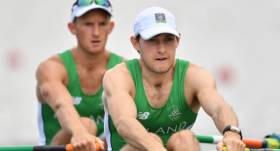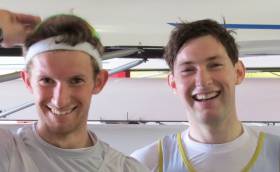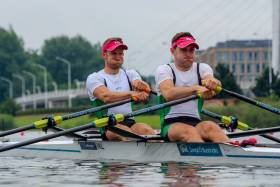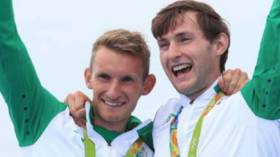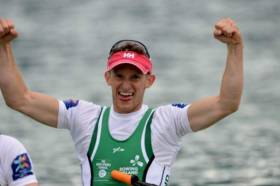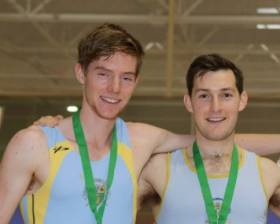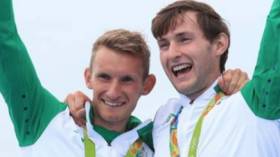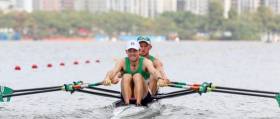Displaying items by tag: Gary O'Donovan
#Rowing: Paul and Gary O’Donovan took fourth place in the A Final of the lightweight double sculls at the World Cup Regatta in Belgrade today. The British crew of Peter Chambers and Will Fletcher took the race on from the start and led by a length at half way.
They come under pressure from the Czech Republic and Ireland in the second half, but in a scrambling finish the British held on for gold, with the Czechs second and Poland holding off Ireland for bronze.
World Cup Regatta, Belgrade (Selected results; Irish interest)
Men
Lightweight Pair – Final: 1 Ireland (M O’Donovan, S O’Driscoll) 6:46.65, 2 Russia 6:47.67, 3 Britain (J Cassells, S Scrimgeour) 6:48.40.
Lightweight Double Sculls – A Final: 1 Britain (P Chambers, W Fletcher) 6:25.67, 2 Czech Republic 6:26.27, 3 Poland 6:26.63; 4 Ireland (G O’Donovan, P O’Donovan) 6:27.12, 5 Netherlands One 6:32.83, 6 Spain 6:38.41.
Women
Lightweight Single Sculls – A Final: 1 Switzerland (P Merz) 7:52.30, 2 Ireland (D Walsh) 7:56.24, 3 Poland (J Dorociak) 7:59.22.
#Rowing: The Ireland lightweight double scull of Paul and Gary O’Donovan won their semi-final at the World Cup Regatta in Belgrade today. In a race run in rainy conditions, the crews were closely-packed in the early part of the race, with Ireland taking a marginal lead by halfway. But then the O’Donovans moved and the race from there was about who would take second and third and join Ireland in the A Final. The Netherlands and Spain did the business to stay in the hunt for medals.
Britain’s Will Fletcher and Peter Chambers won the other semi-final in a fast time.
World Cup Regatta, Belgrade, Day Two (Irish interest, selected results)
Men
Lightweight Pair, Exhibition Race (Contest for Lanes): 1 Britain (J Cassells, S Scrimgeour) 6:39.30, 2 Ireland (M O’Donovan, S O’Driscoll) 6:41.61, 3 Russia 6:43.42, 4 Hungary 7:06.15.
Lightweight Double Sculls – Semi-Finals (Three to A Final; rest to B Final). Semi-Final One: 1 Britain (P Chambers, W Fletcher) 6:23.98, 2 Poland 6:25.85, 3 Czech Republic 6:26.34.
Semi-Final Two (Three to A Final; rest to B Final): 1 Ireland (G O’Donovan, P O’Donovan) 6:30.70, 2 Netherlands 6:32.26, 3 Spain 6:33.89.
Women
Single Sculls – Repechage (First Two to A Final; rest to B Final): 1 Britain (V Thornley) 7:39.32, 2 Ireland (S Puspure) 7:42.17; 3 Belarus Three 7:46.28, 4 Belarus Two 7:28.26, 5 Czech Republic 7:52.49.
#Rowing: Paul and Gary O’Donovan won their heat and qualified directly for the A/B Semi-Finals at the World Cup Regatta in Belgrade this morning. As they often do, the UCD/Skibbereen duo won it in a sprint finish, overtaking the Czech Republic coming up to the line to win by six hundredths of a second. The Czechs and the Netherlands One had disputed the lead through the race, but the O’Donovans tracked them and drew on their remarkable finishing speed to win in six minutes 29.03 seconds.
Peter Chambers and Will Fletcher of Britain won the second heat in a time of six minutes 35.22 seconds.
World Cup Regatta, Belgrade Serbia, Day One (Selected Results; Irish interest)
Men
Pair – Heat Two (First Three to A/B Semi-Finals; rest to Repechage): 1 Britain 6:42.81, Netherlands 6:46.34, 3 Spain 6:50.69; 4 Ireland (M O’Donovan, S O’Driscoll) 6:53.50.
Lightweight Double Sculls – Heat Three (First Two to A/B Semi-Finals; rest to Repechage): 1 Ireland (G O’Donovan, P O’Donovan) 6:29.03, 2 Czech Republic 6:29.09; 3 Netherlands One 6:38.69
Heat Two: 1 Britain (P Chambers, W Fletcher) 6:35.22.
Women
Single Sculls – Heat Two (Winner to A Final; rest to Repechage): 1 Austria (M Lobnig) 7:49.47; 2 Belarus (E Karsten) 7:51.74, 3 Ireland (S Puspure) 7:53.20.
Lightweight Single Sculls – Heat Two (First Two to A Final; rest to Repechage): 1 Ireland (D Walsh) 8:07.51, 2 Poland (J Dorociak) 8:08.22; 3 Switzerland Two 8:11.65.
O'Donovans Back in Action at World Cup Regatta
#Rowing: The 2017 World Rowing Cup series starts in Belgrade, Serbia tomorrow (Friday), running until Sunday. The regatta has attracted rowers from 26 nations and ranking among the medal prospects are athletes who won medals at the Rio 2016 Olympic Games. Ireland’s O’Donovan brothers, Paul and Gary, are back together for 2017 following their Olympic silver medal performance in the lightweight men’s double sculls, with their most notable competition being two of Great Britain’s most experienced lightweight rowers – Peter Chambers and Will Fletcher.
Shane O’ Driscoll and Mark O’Donovan will race in the men’s pair, in both the lightweight and heavyweight categories. Two-time Olympian Sanita Puspure will once again compete in the women’s single sculls, while Denise Walsh will feature in the lightweight equivalent. Puspure will come up against frequent opponent and fellow Rio Olympian, Belarussian Ekaterina Karsten. Puspure lost out to Karsten in the quarter-finals in Rio and went on to finish five positions back from her, in 13th place.
This is the first of three World Cup events in 2017. The season opener is generally an opportunity for teams to experiment with athletes and crews and see which combinations may work for the season ahead. In this post-Olympic year, it will be particularly interesting to see what the opposition holds due to retirees, new athletes/combinations and new talent emerging.
Friday’s start times are as follows (Irish times/all heats):
Lightweight Women’s Single Scull
09:05 – Denise Walsh (Skibbereen RC)
Men’s Pair
09:30 – Mark O’ Donovan (Skibbereen RC)/Shane O’ Driscoll (Skibbereen RC)
Women’s Single Scull
10:20 – Sanita Puspure
Lightweight Men’s Double Sculls
10:50 – Gary O’ Donovan (Skibbereen RC)/Paul O’ Donovan (UCD BC)
O'Donovans Lead International Brigade at Skibbereen
#Rowing: Paul O’Donovan maintained his dominance in the single sculls with a win over his brother, Gary, at the Skibbereen Grand League Regatta at the National Rowing Centre. Daire Lynch missed the race through illness. Shane O’Driscoll and Mark O’Donovan of the host club were emphatic winners of the pair, but Shane Mulvaney and David O’Malley had withdrawn from the heats because Mulvaney had suffered heart palpitations. He was taken the hospital for observation.
Sanita Puspure won the single sculls final with over 11 seconds to spare over Monika Dukarska. Aileen Crowley of UCD, just back from Australia, was third. The women’s pair was won by the UCC crew of Aifric Keogh and Aoife Feeley. UCD’s Ruth Gilligan and Eimear Lambe, with a reverse of the usual order which saw Gilligan move to stroke, did not do well in the heat and competed in the B Final.
Skibbereen Grand League Regatta, National Rowing Centre (Selected Results; with Per Centage of Projected World Best Time)
Men
Eight – Division Two – A Final: 1 Queen’s (nov) 7:04.6. 3 Univ of Limerick (club two) 7:25.3, 6 Col Iognaid (jun 16) 7:40.6.
Pair – A Final: 1 Skibbereen (sen) 7:43.6 (80.46), 2 Commercial (sen) 7:50.8, 3 Enniskillen (jun 18A) 7:56.4; 4 Cork A (inter) 8:04.8 (76.95). C Final: 3 St Michael’s (club one) 8:10.1 (76.11).
Sculling
Single – A Final: 1 UCD (P O’Donovan; senior) 7:58.3 (81.78 per cent), 2 Skibbereen (G O’Donovan; sen) 8:03.4 (80.88), 3 UCD (A Goff; lightweight) 8:17.1 (78.66). B Final: 2 Skibbereen (K Mannix; intermediate) 8:21.6 (77.95); 5 Three Castles (R Quinn; jun 18A) 8:36.4 (75.71).
Women
Pair – A Final: 1 UCC (sen) 8:39.8 (79.06), 2 Cork (inter) 8:40.5 (78.96), 3 Fermoy (jun 18A) 8:47.1 (77.97). B Final: 3 Belfast BC (club one) 9:14.9 (74.07); 6 Cork A (jun 18A) 9:35.7 (71.39)
Sculling
Quadruple – Div Two, coxed – A Final: Cork (jun 18B) 8:34.6, 2 Lee A (club two) 8:47.4, 3 Carlow (jun 16), 4 Garda (club two) 9:00.0.
1 Tralee (jun 16) 9:08.7. 2 Flesk Valley (nov) 9:16.0, 3 Cork (club two) 9:52.3
Single – A Final: 1 Old Collegians (S Puspure; sen) 8:33.5 (82.97), 2 Killorglin (M Dukarska; sen) 8:45.0 (81.14), 3 UCD (A Crowley; inter) 9:06.8 (77.91). B Final: 3 Col Iognaid (C Nic Dhonncha; jun 18A) 9:38.1 (73.69), 4 Lee Valley (E O’Mahony; club one) 9:45.6 (72.75).
Gary O'Donovan is Afloat Rower of the Month
#Rowing: The Afloat Rower of the Month for March is Gary O’Donovan. The Skibbereen man beat heavyweight oarsmen Sam McKeown and Daire Lynch in the single sculls final at the Ireland Trial. The conditions, with a cross headwind, were difficult for a lightweight. However, O’Donovan was sharpest in the closings stages and won. Paul, his younger brother and crewmate in the lightweight double which took silver at the Olympic Games, had exam pressures and had missed the trial. Named the Rower of the Month by Worldrowing.com, Paul O’Donovan was typically provocative when asked if he would ever team up with anyone other than his brother: “Gary is quite fast so I often row the double scull with him but if I could row with someone faster I would be happy.” Facing into the 2017 campaign, Gary proved that he is a key member of Ireland’s top crew.
Rower of the Month awards: The judging panel is made up of Liam Gorman, rowing correspondent of The Irish Times, and David O'Brien, editor of Afloat magazine. Monthly awards for achievements during the year will appear on afloat.ie. Keep a monthly eye on progress and watch our 2017 champions list grow.
Gary O'Donovan Hits the Mark at Irish Trial
Top Irish internationals saw off challenges in the finals of the Irish Trials at the National Rowing Centre in Cork today. Gary O'Donovan trailed Sam McKeown after 1500 metres of the single sculls final, but the Rio medalist took the lead and won - despite the disadvantage of being a lightweight sculling into a bothersome headwind. Paul O'Donovan missed out through exam pressures.
Top heavyweight Sanita Puspure was a clear winner over Monika Dukarska in the women's single sculls final. Ireland lightweight international Denise Walsh bested outstanding 17-year-old heavyweight Hannah Scott in a fight for third.
Mark O'Donovan and Shane O'Driscoll had an easy victory in the men's pair. UCD's crew of Shane Mulvaney and David O'Malley had earlier pulled out due to Mulvaney falling ill.
The women's pair of Aifric Keogh and Aoife Feeley came out on top in their battle with under-23 crew Eimear Lambe and Ruth Gilligan.
Stars to Shine at Indoor Rowing Championships
#Rowing: The entry for the Irish Indoor Rowing Championships on Saturday (January 21st) at the University of Limerick is over 200 up on last year, a new record for the event. There are 1202 entrants from 115 clubs, 63 of them Rowing Ireland clubs. There are over 40 entrants from overseas, with 39 from the United Kingdom. Races will run every five to 10 minutes and there are 1663 race slots in total. The event is compulsory for high performance rowers and Ireland Olympians Paul and Gary O’Donovan, Claire Lambe and Sanita Puspure are entered. There is no charge for spectators.
Gary and Paul O'Donovan Afloat Rowers of the Year
#Rowers of the Year: The Afloat Rowers of the Year for 2016 are Paul O’Donovan and Gary O’Donovan. Between them they brought Ireland two gold medals and two silvers at top international events in 2016.
The highlight was the silver medal at the Olympic Games in Rio de Janeiro in August for the Ireland lightweight double. The O’Donovan brothers covered the early part of the race more in contact with the field than has become their normal style and in an exciting finish they split gold medallists France and bronze medallists Norway to become the first Irish rowers to mount the podium at an Olympic Games.
Paul O’Donovan has spoken more than once about the frustration of watching that race, as he did not win. The 22-year-old UCD oarsman is phenomenally disciplined in pursuit of his sporting goals. He showed this in 2016 by travelling on from Rio de Janeiro to Rotterdam to compete in the lightweight single sculls at the World Championships. He won every race there. He let the race develop in front of him in the final and then sprinted past the other competitors to win by a clear water margin. He was the only rower to compete successfully at World Championship and Olympic level in 2016.
The O’Donovans had laid down their markers early on as a lightweight double: they took silver behind South Africa at the World Cup in Varese in Italy and then beat Norway to take gold at the European Championships in Brandenburg in Germany. The wild conditions were frightening for some, but the two men from west Cork made light of them. Whatever the weather, they are competitors.
Two of the best Ireland has seen.
The O’Donovans are the Afloat Rowers of the Year 2016.
Rower of the Month awards: The judging panel is made up of Liam Gorman, rowing correspondent of The Irish Times, and David O'Brien, editor of Afloat magazine. Monthly awards for achievements during the year appeared on afloat.ie.
O’Donovan Brothers Are RTÉ’s Sport Team Of 2016
#Rowing - Paul and Gary O’Donovan were last night named Team of the Year at the RTÉ Sport Awards, as RTÉ News reports.
The Olympic silver medallists in the lightweight double sculls in Rio this summer captured the hearts of the nation with their light-hearted post-race interview and subsequent appearance on The Late Late Show with fellow Olympic hero Annalise Murphy.
And just like Murphy, who added The Irish Times/Sports Council of Ireland Sportswoman of the Year award to her long list of accolades on Friday (16 December), the Skibbereen rowing brothers (and Afloat.ie Rowers of the Month for August) show no signs of resting on their laurels.
"We’re young yet, we’re only starting out hopefully," said Paul on the night. "We’ve got a taste of success now, so we’re going to capitalise on it."
Indeed, his brother Gary was back in the boat just hours before the awards ceremony for the Ireland Assessment at the National Rowing Centre — Paul only missing out due to Christmas exams.



























